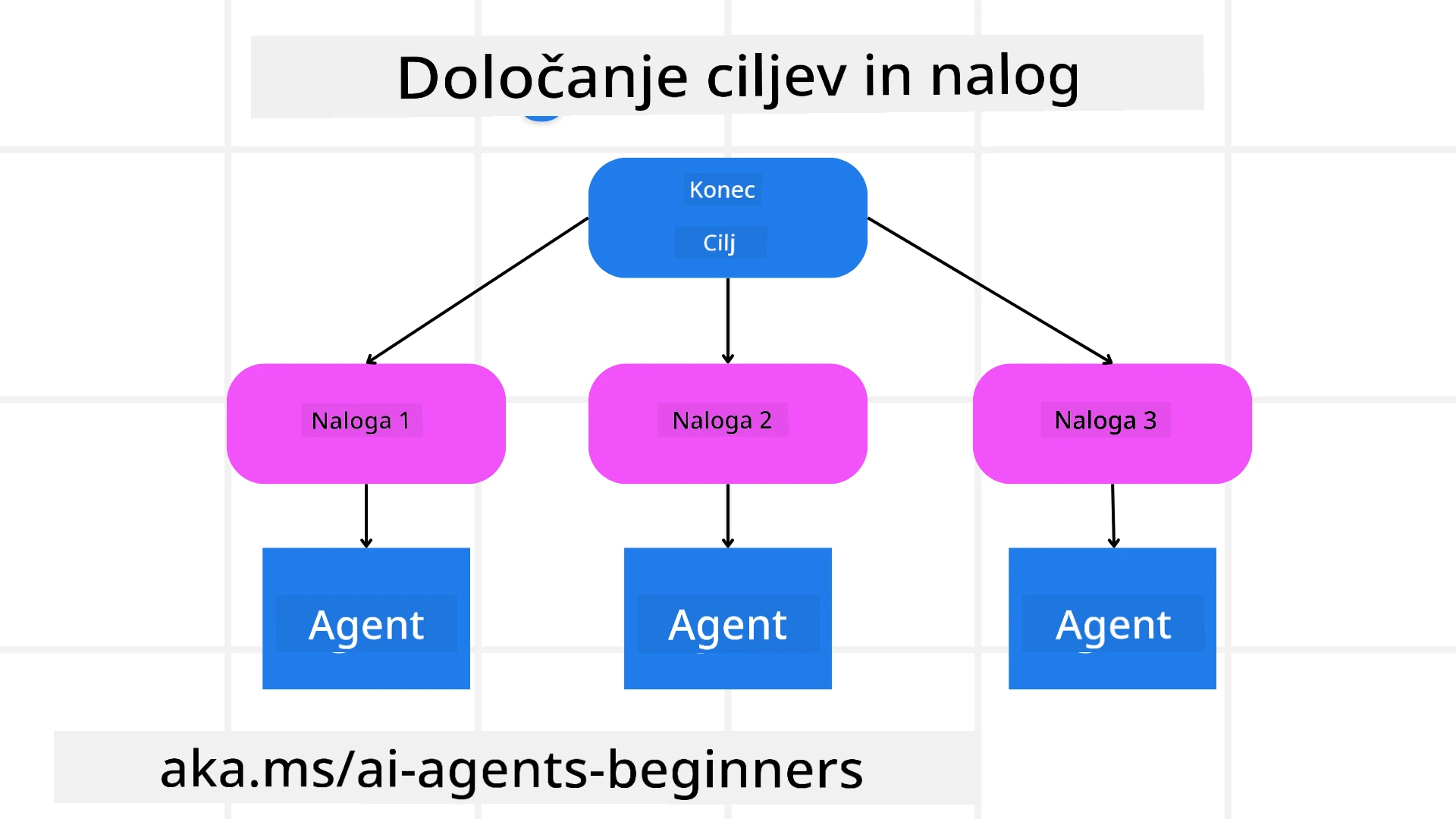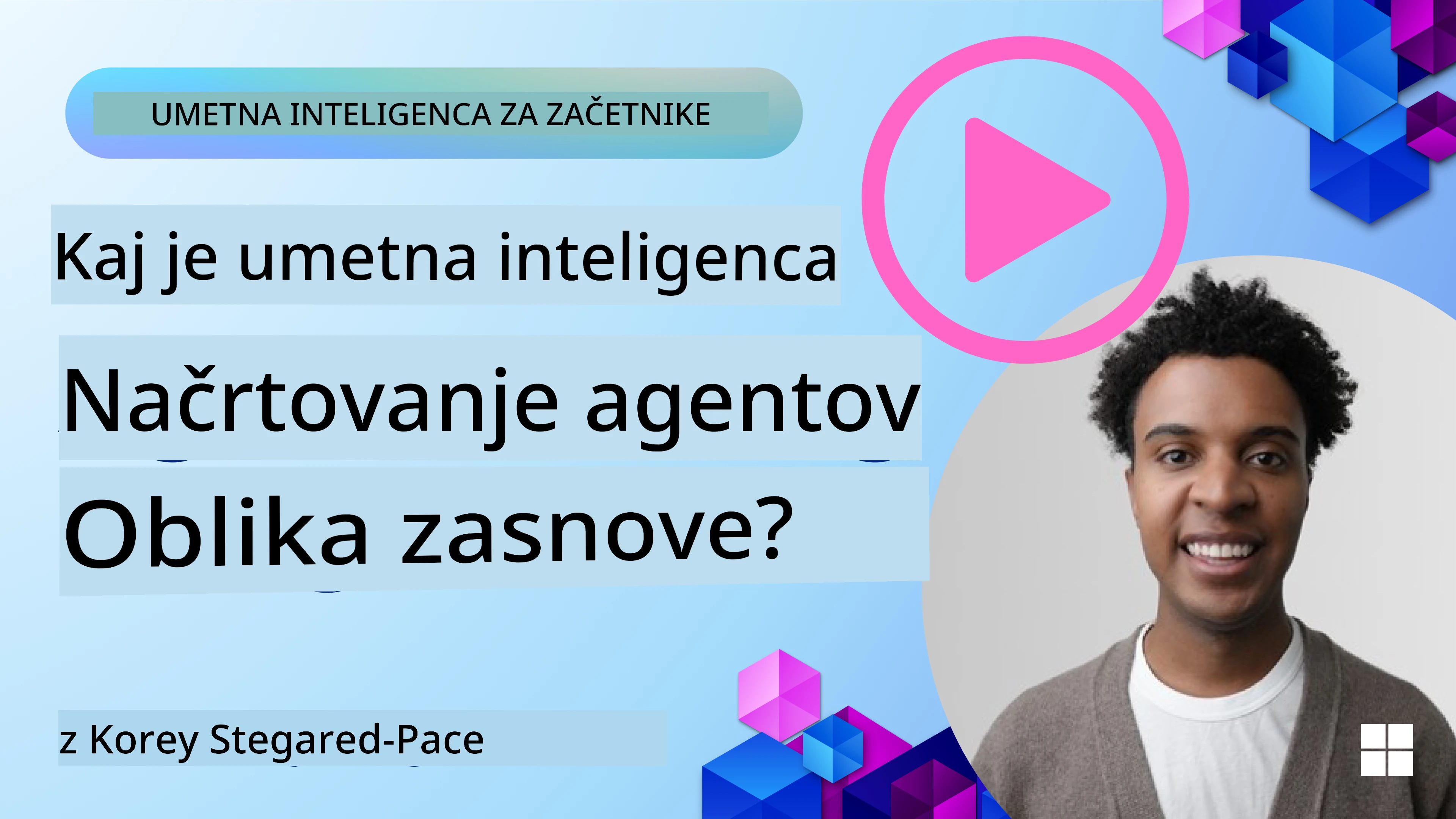ai-agents-for-beginners
(Kliknite na zgornjo sliko za ogled videa te lekcije)
Načrtovanje načrta
Uvod
Ta lekcija bo obravnavala:
- Določanje jasnega splošnega cilja in razdelitev kompleksne naloge na obvladljive naloge.
- Uporaba strukturiranega izhoda za bolj zanesljive in strojno berljive odgovore.
- Uporaba pristopa, ki temelji na dogodkih, za obravnavo dinamičnih nalog in nepričakovanih vnosov.
Cilji učenja
Po zaključku te lekcije boste razumeli:
- Kako določiti in postaviti splošni cilj za AI agenta, da bo jasno vedel, kaj je treba doseči.
- Kako razdeliti kompleksno nalogo na obvladljive podnaloge in jih organizirati v logično zaporedje.
- Kako opremiti agente s pravimi orodji (npr. iskalna orodja ali orodja za analizo podatkov), odločiti, kdaj in kako jih uporabiti, ter obravnavati nepričakovane situacije.
- Kako oceniti rezultate podnalog, meriti uspešnost in iterirati dejanja za izboljšanje končnega izhoda.
Določanje splošnega cilja in razdelitev naloge

Večina nalog v resničnem svetu je preveč kompleksnih, da bi jih lahko obravnavali v enem koraku. AI agent potrebuje jedrnat cilj, ki usmerja njegovo načrtovanje in dejanja. Na primer, razmislite o cilju:
"Ustvari tridnevni potovalni načrt."
Čeprav je preprosto izražen, ga je še vedno treba izpopolniti. Bolj jasen kot je cilj, boljši so agent (in morebitni človeški sodelavci) pri osredotočanju na dosego pravega rezultata, kot je ustvarjanje celovitega načrta z možnostmi letov, priporočili za hotele in predlogi aktivnosti.
Razdelitev naloge
Velike ali zapletene naloge postanejo bolj obvladljive, ko jih razdelimo na manjše, ciljno usmerjene podnaloge. Za primer potovalnega načrta lahko cilj razdelite na:
- Rezervacija letov
- Rezervacija hotelov
- Najem avtomobila
- Personalizacija
Vsako podnalogo lahko nato obravnavajo namenski agenti ali procesi. En agent se lahko specializira za iskanje najboljših ponudb za lete, drugi za rezervacije hotelov itd. Koordinacijski ali “nadaljnji” agent lahko nato združi te rezultate v enoten načrt za končnega uporabnika.
Ta modularni pristop omogoča tudi postopne izboljšave. Na primer, lahko dodate specializirane agente za priporočila hrane ali predloge lokalnih aktivnosti ter sčasoma izpopolnite načrt.
Strukturiran izhod
Veliki jezikovni modeli (LLM) lahko ustvarijo strukturiran izhod (npr. JSON), ki ga je lažje razčleniti in obdelati za nadaljnje agente ali storitve. To je še posebej uporabno v kontekstu več agentov, kjer lahko te naloge izvedemo po prejemu načrtovanega izhoda. Za hiter pregled si oglejte:
Naslednji Pythonov delček prikazuje preprost načrtovalni agent, ki razdeli cilj na podnaloge in ustvari strukturiran načrt:
from pydantic import BaseModel
from enum import Enum
from typing import List, Optional, Union
import json
import os
from typing import Optional
from pprint import pprint
from autogen_core.models import UserMessage, SystemMessage, AssistantMessage
from autogen_ext.models.azure import AzureAIChatCompletionClient
from azure.core.credentials import AzureKeyCredential
class AgentEnum(str, Enum):
FlightBooking = "flight_booking"
HotelBooking = "hotel_booking"
CarRental = "car_rental"
ActivitiesBooking = "activities_booking"
DestinationInfo = "destination_info"
DefaultAgent = "default_agent"
GroupChatManager = "group_chat_manager"
# Travel SubTask Model
class TravelSubTask(BaseModel):
task_details: str
assigned_agent: AgentEnum # we want to assign the task to the agent
class TravelPlan(BaseModel):
main_task: str
subtasks: List[TravelSubTask]
is_greeting: bool
client = AzureAIChatCompletionClient(
model="gpt-4o-mini",
endpoint="https://models.inference.ai.azure.com",
# To authenticate with the model you will need to generate a personal access token (PAT) in your GitHub settings.
# Create your PAT token by following instructions here: https://docs.github.com/en/authentication/keeping-your-account-and-data-secure/managing-your-personal-access-tokens
credential=AzureKeyCredential(os.environ["GITHUB_TOKEN"]),
model_info={
"json_output": False,
"function_calling": True,
"vision": True,
"family": "unknown",
},
)
# Define the user message
messages = [
SystemMessage(content="""You are an planner agent.
Your job is to decide which agents to run based on the user's request.
Provide your response in JSON format with the following structure:
{'main_task': 'Plan a family trip from Singapore to Melbourne.',
'subtasks': [{'assigned_agent': 'flight_booking',
'task_details': 'Book round-trip flights from Singapore to '
'Melbourne.'}
Below are the available agents specialised in different tasks:
- FlightBooking: For booking flights and providing flight information
- HotelBooking: For booking hotels and providing hotel information
- CarRental: For booking cars and providing car rental information
- ActivitiesBooking: For booking activities and providing activity information
- DestinationInfo: For providing information about destinations
- DefaultAgent: For handling general requests""", source="system"),
UserMessage(
content="Create a travel plan for a family of 2 kids from Singapore to Melboune", source="user"),
]
response = await client.create(messages=messages, extra_create_args={"response_format": 'json_object'})
response_content: Optional[str] = response.content if isinstance(
response.content, str) else None
if response_content is None:
raise ValueError("Response content is not a valid JSON string" )
pprint(json.loads(response_content))
# # Ensure the response content is a valid JSON string before loading it
# response_content: Optional[str] = response.content if isinstance(
# response.content, str) else None
# if response_content is None:
# raise ValueError("Response content is not a valid JSON string")
# # Print the response content after loading it as JSON
# pprint(json.loads(response_content))
# Validate the response content with the MathReasoning model
# TravelPlan.model_validate(json.loads(response_content))
Načrtovalni agent z orkestracijo več agentov
V tem primeru Semantični usmerjevalni agent prejme zahtevo uporabnika (npr. “Potrebujem načrt za hotel za svoje potovanje.”).
Načrtovalec nato:
- Prejme načrt za hotel: Načrtovalec vzame uporabnikovo sporočilo in na podlagi sistemskega poziva (vključno s podrobnostmi o razpoložljivih agentih) ustvari strukturiran potovalni načrt.
- Navede agente in njihova orodja: Register agentov vsebuje seznam agentov (npr. za lete, hotele, najem avtomobilov in aktivnosti) skupaj s funkcijami ali orodji, ki jih ponujajo.
- Usmeri načrt k ustreznim agentom: Glede na število podnalog načrtovalec bodisi pošlje sporočilo neposredno namenskim agentom (za scenarije z eno nalogo) bodisi koordinira prek upravitelja skupinskega klepeta za sodelovanje več agentov.
- Povzame rezultat: Na koncu načrtovalec povzame ustvarjeni načrt za jasnost. Naslednji Pythonov vzorec kode prikazuje te korake:
from pydantic import BaseModel
from enum import Enum
from typing import List, Optional, Union
class AgentEnum(str, Enum):
FlightBooking = "flight_booking"
HotelBooking = "hotel_booking"
CarRental = "car_rental"
ActivitiesBooking = "activities_booking"
DestinationInfo = "destination_info"
DefaultAgent = "default_agent"
GroupChatManager = "group_chat_manager"
# Travel SubTask Model
class TravelSubTask(BaseModel):
task_details: str
assigned_agent: AgentEnum # we want to assign the task to the agent
class TravelPlan(BaseModel):
main_task: str
subtasks: List[TravelSubTask]
is_greeting: bool
import json
import os
from typing import Optional
from autogen_core.models import UserMessage, SystemMessage, AssistantMessage
from autogen_ext.models.openai import AzureOpenAIChatCompletionClient
# Create the client with type-checked environment variables
client = AzureOpenAIChatCompletionClient(
azure_deployment=os.getenv("AZURE_OPENAI_DEPLOYMENT_NAME"),
model=os.getenv("AZURE_OPENAI_DEPLOYMENT_NAME"),
api_version=os.getenv("AZURE_OPENAI_API_VERSION"),
azure_endpoint=os.getenv("AZURE_OPENAI_ENDPOINT"),
api_key=os.getenv("AZURE_OPENAI_API_KEY"),
)
from pprint import pprint
# Define the user message
messages = [
SystemMessage(content="""You are an planner agent.
Your job is to decide which agents to run based on the user's request.
Below are the available agents specialized in different tasks:
- FlightBooking: For booking flights and providing flight information
- HotelBooking: For booking hotels and providing hotel information
- CarRental: For booking cars and providing car rental information
- ActivitiesBooking: For booking activities and providing activity information
- DestinationInfo: For providing information about destinations
- DefaultAgent: For handling general requests""", source="system"),
UserMessage(content="Create a travel plan for a family of 2 kids from Singapore to Melbourne", source="user"),
]
response = await client.create(messages=messages, extra_create_args={"response_format": TravelPlan})
# Ensure the response content is a valid JSON string before loading it
response_content: Optional[str] = response.content if isinstance(response.content, str) else None
if response_content is None:
raise ValueError("Response content is not a valid JSON string")
# Print the response content after loading it as JSON
pprint(json.loads(response_content))
Sledi izhod iz prejšnje kode, ki ga lahko nato uporabite za usmerjanje k assigned_agent in povzemanje potovalnega načrta za končnega uporabnika.
{
"is_greeting": "False",
"main_task": "Plan a family trip from Singapore to Melbourne.",
"subtasks": [
{
"assigned_agent": "flight_booking",
"task_details": "Book round-trip flights from Singapore to Melbourne."
},
{
"assigned_agent": "hotel_booking",
"task_details": "Find family-friendly hotels in Melbourne."
},
{
"assigned_agent": "car_rental",
"task_details": "Arrange a car rental suitable for a family of four in Melbourne."
},
{
"assigned_agent": "activities_booking",
"task_details": "List family-friendly activities in Melbourne."
},
{
"assigned_agent": "destination_info",
"task_details": "Provide information about Melbourne as a travel destination."
}
]
}
Primer zvezka s prejšnjim vzorcem kode je na voljo tukaj.
Iterativno načrtovanje
Nekatere naloge zahtevajo povratno komunikacijo ali ponovno načrtovanje, kjer rezultat ene podnaloge vpliva na naslednjo. Na primer, če agent odkrije nepričakovano obliko podatkov med rezervacijo letov, bo morda moral prilagoditi svojo strategijo, preden nadaljuje z rezervacijo hotelov.
Poleg tega lahko povratne informacije uporabnika (npr. odločitev človeka, da raje izbere zgodnejši let) sprožijo delno ponovno načrtovanje. Ta dinamičen, iterativen pristop zagotavlja, da se končna rešitev ujema z resničnimi omejitvami in spreminjajočimi se preferencami uporabnika.
npr. vzorec kode
from autogen_core.models import UserMessage, SystemMessage, AssistantMessage
#.. same as previous code and pass on the user history, current plan
messages = [
SystemMessage(content="""You are a planner agent to optimize the
Your job is to decide which agents to run based on the user's request.
Below are the available agents specialized in different tasks:
- FlightBooking: For booking flights and providing flight information
- HotelBooking: For booking hotels and providing hotel information
- CarRental: For booking cars and providing car rental information
- ActivitiesBooking: For booking activities and providing activity information
- DestinationInfo: For providing information about destinations
- DefaultAgent: For handling general requests""", source="system"),
UserMessage(content="Create a travel plan for a family of 2 kids from Singapore to Melbourne", source="user"),
AssistantMessage(content=f"Previous travel plan - {TravelPlan}", source="assistant")
]
# .. re-plan and send the tasks to respective agents
Za bolj celovito načrtovanje si oglejte Magnetic One za reševanje kompleksnih nalog.
Povzetek
V tem članku smo si ogledali primer, kako lahko ustvarimo načrtovalca, ki dinamično izbere razpoložljive agente, ki so opredeljeni. Izhod načrtovalca razdeli naloge in dodeli agente, da jih lahko izvedejo. Predpostavlja se, da imajo agenti dostop do funkcij/orodij, ki so potrebna za izvedbo naloge. Poleg agentov lahko vključite tudi druge vzorce, kot so refleksija, povzemanje in kroženje klepeta, da dodatno prilagodite.
Dodatni viri
AutoGen Magnetic One - Generalistični sistem več agentov za reševanje kompleksnih nalog, ki je dosegel impresivne rezultate na več zahtevnih merilih za agente. Referenca:
. V tej implementaciji orkestrator ustvari načrt, specifičen za nalogo, in delegira te naloge razpoložljivim agentom. Poleg načrtovanja orkestrator uporablja tudi mehanizem sledenja za spremljanje napredka naloge in ponovno načrtovanje po potrebi.
Imate več vprašanj o vzorcu načrtovanja?
Pridružite se Azure AI Foundry Discord, da se povežete z drugimi učenci, udeležite uradnih ur in dobite odgovore na svoja vprašanja o AI agentih.
Prejšnja lekcija
Gradnja zaupanja vrednih AI agentov
Naslednja lekcija
Vzorec oblikovanja več agentov
Omejitev odgovornosti:
Ta dokument je bil preveden z uporabo storitve za prevajanje z umetno inteligenco Co-op Translator. Čeprav si prizadevamo za natančnost, vas prosimo, da upoštevate, da lahko avtomatizirani prevodi vsebujejo napake ali netočnosti. Izvirni dokument v njegovem maternem jeziku je treba obravnavati kot avtoritativni vir. Za ključne informacije priporočamo profesionalni človeški prevod. Ne prevzemamo odgovornosti za morebitna nesporazumevanja ali napačne razlage, ki bi nastale zaradi uporabe tega prevoda.
